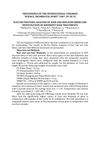 14 citations,
January 1996 in “Journal of Forensic Sciences”
14 citations,
January 1996 in “Journal of Forensic Sciences” Hair can absorb and transfer opiates when soaked in water, with damaged hair absorbing more.
January 2025 in “Molecules” Caffeine may help with hair loss, but more research is needed to confirm its effectiveness.
 18 citations,
October 2014 in “Experimental Biology and Medicine”
18 citations,
October 2014 in “Experimental Biology and Medicine” Eating vitamin A affects hair growth and health by changing cell signals in mice.
 1 citations,
December 2022 in “Experimental cell research”
1 citations,
December 2022 in “Experimental cell research” Prostaglandin E2 collagen matrix may help stimulate hair growth.
 22 citations,
August 1999 in “Experimental Dermatology”
22 citations,
August 1999 in “Experimental Dermatology” Certain drugs can cause early hair growth in mice by affecting the nerves.
1 citations,
November 2016 in “Saengmyeong gwahag hoeji/Saengmyeong gwahak hoeji” New treatments for the autoimmune hair loss condition alopecia areata may include JAK inhibitors and other immunomodulators.
 January 1996 in “Springer eBooks”
January 1996 in “Springer eBooks” Hair loss increases with age and is triggered by hormones like androgens.
 6 citations,
January 2020 in “The journal of investigative dermatology/Journal of investigative dermatology”
6 citations,
January 2020 in “The journal of investigative dermatology/Journal of investigative dermatology” New topical treatment using spherical nucleic acids shows promise in reducing psoriasis inflammation.
 8 citations,
September 2021 in “Skin appendage disorders”
8 citations,
September 2021 in “Skin appendage disorders” Trichotillomania treatment is most successful with a mix of behavioral therapy, medication, and social support.
44 citations,
January 2013 in “BMC Dermatology” TGFβ signaling prevents sebaceous gland cells from producing fats.
 August 2021 in “Clinical and Experimental Dermatology”
August 2021 in “Clinical and Experimental Dermatology” Children under 10 can experience hair thinning without hormone issues, and it may improve with treatment.
 January 2017 in “Nasza Dermatologia Online”
January 2017 in “Nasza Dermatologia Online” Both treatments helped hair regrowth in alopecia areata, with isopropanol being better tolerated.
 November 2024 in “Applied Sciences”
November 2024 in “Applied Sciences” Placenta products might help with hair loss, but more research is needed.

Hair properties change under electromagnetic fields and are influenced by individual characteristics and the environment.
 50 citations,
May 2020 in “Journal of Clinical Medicine”
50 citations,
May 2020 in “Journal of Clinical Medicine” Non-binary transgender individuals need personalized hormonal treatments for better well-being and quality of life.
 July 2013 in “Our Dermatology Online”
July 2013 in “Our Dermatology Online” Oral methylprednisolone pulse therapy helped an 11-year-old regrow 80% of his hair in six months.
 1 citations,
December 2022 in “The journal of investigative dermatology/Journal of investigative dermatology”
1 citations,
December 2022 in “The journal of investigative dermatology/Journal of investigative dermatology” Choosing the right method to separate skin layers is key for good skin cell research.
17 citations,
November 2017 in “Experimental physiology” Breathing in newborn rats is affected differently by hormones based on their sex.
 26 citations,
December 2016 in “Pharmacology & Therapeutics”
26 citations,
December 2016 in “Pharmacology & Therapeutics” New drugs for heart disease may be developed from molecules secreted by stem cells.
 30 citations,
September 2003 in “Experimental Dermatology”
30 citations,
September 2003 in “Experimental Dermatology” Minoxidil helps prevent stress-caused hair loss in mice.
 1 citations,
July 2002 in “Clinical and Experimental Dermatology”
1 citations,
July 2002 in “Clinical and Experimental Dermatology” The document concludes that understanding hair loss and its psychological impact is crucial for physicians to provide effective counseling and treatment to patients.
 18 citations,
September 2018 in “Experimental physiology”
18 citations,
September 2018 in “Experimental physiology” Electro-acupuncture may help treat PCOS in rats by changing brain DNA methylation.
 29 citations,
July 1982 in “British Journal of Dermatology”
29 citations,
July 1982 in “British Journal of Dermatology” Lithium treatment can cause increased hair shedding and hair loss in patients.
 3 citations,
September 2019 in “Clinical and experimental dermatology”
3 citations,
September 2019 in “Clinical and experimental dermatology” Basal cell carcinomas may differentiate similarly to hair follicles and could be influenced by hair cycle-related treatments.
 31 citations,
April 2019 in “Experimental and Therapeutic Medicine”
31 citations,
April 2019 in “Experimental and Therapeutic Medicine” β-blockers can cause skin problems like psoriasis and vitiligo, and doctors should tell patients about these risks.
4 citations,
March 2021 in “Experimental dermatology” Minoxidil increases nail growth more than biotin.
 November 2023 in “Turkish journal of botany”
November 2023 in “Turkish journal of botany” Türkiye uses many local plants to treat skin problems.
January 2022 in “Pastic and aesthetic research” PRP helps skin regeneration but needs standardized testing for consistent results.
 2 citations,
January 2022 in “Experimental Dermatology”
2 citations,
January 2022 in “Experimental Dermatology” GDNF signaling helps in hair growth and skin healing after a wound.
61 citations,
October 2011 in “Experimental dermatology” Scalp itching is common and hard to diagnose due to the complex nerve structure of the scalp.























